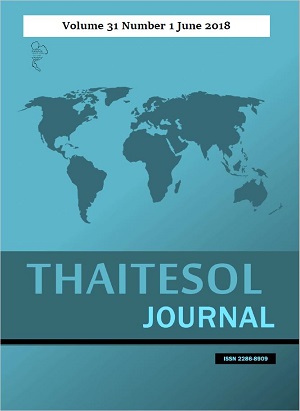Factors Enhancing English Speaking Ability: Perspectives from Thai High School Students and Their Teachers
Main Article Content
Abstract
Regarding the English language skills, speaking seems to be the most crucial skill in terms of communication or interaction in daily lives (Ur, 1996). This present study aimed to investigate factors enhancing English speaking ability, also the most influential factor affecting speaking ability. The participants were 5 high school students who had received awards from a national speech competition to guarantee their English speaking ability and 10 English teachers who had taught those students or trained them to participate in the competition. Semi- structured interview and in-depth interview were used as research instruments. The findings revealed that factors which enhanced the students to be fluent in speaking English were their language learning styles, age, attitudes, family support, personality, exposure to the language, and their English teachers, while personality and their exposure to the language were the most influential factors. The results of this study will benefit both teachers and students in regard to getting insight on the factors that may have an influence on the students’ English speaking ability.
Article Details
Materials in THAITESOL JOURNAL may be photocopied for educational purposes. Under no circumstances may any part of this journal be photocopied for commercial purposes.
References
Procedia Social and Behavioral Science, 2(2010), 1305-1309.
Brown, H. D. (1994). Teaching by principles: An interactive approach to language pedagogy.
Englewood Cliffs, NJ: Prentice Hall Regents.
Chaney, A. L., & Burk, T. L. (1998). Teaching oral communication in grade K-8. Boston:
Allyn and Bacon.
Darasawang, P. (2007). English language teaching and education in Thailand: A decade of
change. In N. D. Prescott (Eds.), English in Southeast Asia: Varieties, literacies and
literatures (pp. 187-204). Cambridge Scholars Publishing.
Horwitz, E. K., Horwitz, M.B., & Cope, J. (1986). Foreign language classroom anxiety. The Modern
Language Journal, 70(2), 125-132.
Juhana, (2012). Psychological Factors that Hinder Students from Speaking in English Class
(A Case Study in a Senior High School in South Tangerang, Banten, indonesia). Journal
of Education and Practice, 3(12), 100-110.
Khamkhien. A. (2011). Quantitative and qualitative views of Thai EFL learners’ learning oral
communications skills. Academic Research International, 1(1), 90-103.
Latha, B. M., & Ramesh, P. (2012). Teaching English as a second language: Factors affecting
learning Speaking Skills. International Journal of Engineering Research & Technology
(IJERT). 1(7), 1-6.
Lightbown, P. M., & Spada, N. (2013). How Languages are Learned 4th edition-Oxford
Handbooks for Language Teachers (4th ed.). Oxford: Oxford University Press.
Mahripah, S. (2013). EFL Learners’ attitudes towards the improvement of their English
speaking performance. LITERA, 12(2). 287-299.
Mazouzi, S. (2013). Analysis of Some Factors Affecting Learners’ Oral Performance. A Case
Study: 3rd Year Pupils of Menaa’s Middle Schools (M.A. Dissertation). Department of
Foreign Language, English Division, Faculty of Letters and Languages, Mohamed
Khider University of Biskra, People’s Democratic Republic of Algeria.
Ministry of Education. (2002). The Basic Education Core Curriculum 2002. Bangkok:
Kurusapa Ladprao Publishing.
Nillo, J. (2014). Factors Affecting Speaking Skills. Retrieved from
http://slideshare.net/joalexnillo/facots-affecting-speaking-skills
Nunan, D. (2003). Practical English Language Teaching. New York, NY: McGraw Hill.
Oxford, R. (2003). Language learning styles and strategies: An overview. Proceedings of GALA
(Generative Approaches to Language Acquisition) Conference, 1-25. Retrieved from
http://web.ntpu.edu.tw/language/workshop/read2.pdf
Rubin, J., & Thompson, I. (1994). How to become a more successful language learner.
Boston, MA: Heinle & Heinle.
Sa-adpan, W. (2008). A study of factors affecting the English proficiency of non-native
English speaking students at the Asian Institute of Technology.(master’s thesis).
Thammasat university.
Shumin, K. (1997). Factors to consider: Developing adult EFL students’ speaking abilities.
English Teaching Forum. 35(3), 8. Retrieved from
http://dosfan.lib.uic.edu/usia/E-USIA/forum/vols/vol35/no3/p8.htm
Srisang, T. (2014). Problem for Thai university English major students when speaking
English.(master’s thesis). Thammasat university.
Teng, B., & Sinwongsuwat, K. (2015). Teaching and learning English in Thailand and the
integration of Conversation Analysis (CA) into the classroom. English Language
Teaching, 8(3), 13-23.
Ur, P. (1996). A Course in Language Teaching: Practice and Theory. New York, NY:
Cambridge University Press.
Uthaiphetra, P. (2014). Learning styles of English major and non-English major Thai EFL
Learners.(master’s thesis). Thammasat university.
Wanich, W. (2014). The relationship between the CLT approach and Thai EFL students’
attitudes and motivation in leaning speaking. Language Education and Acquisition
Research Network Journal, 7(1), 106-124.
Xiuqin, Z. (2006). Speaking Skills and Anxiety. CELEA Journal (Bimonthly), 29(1), 34-39.


